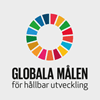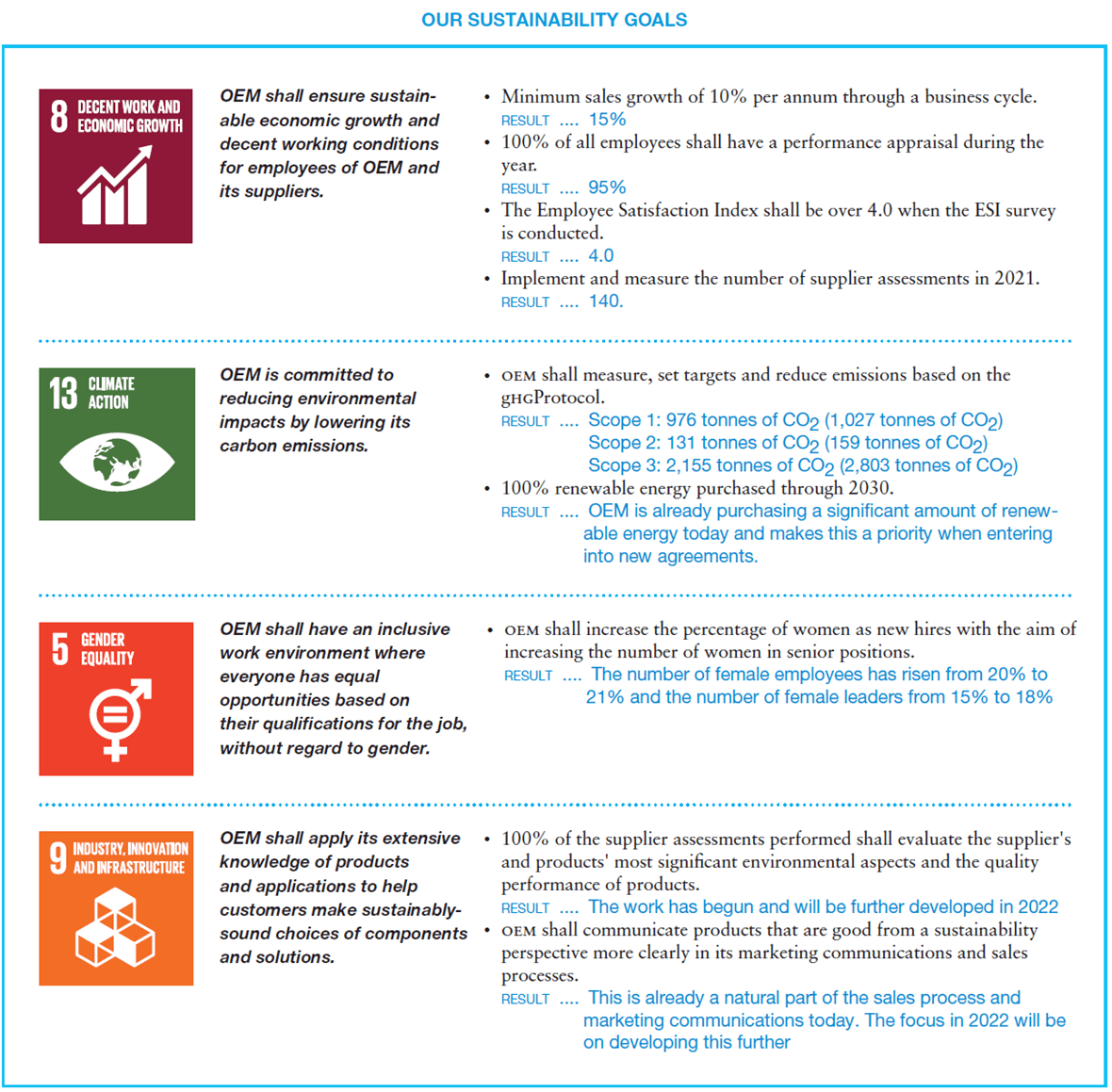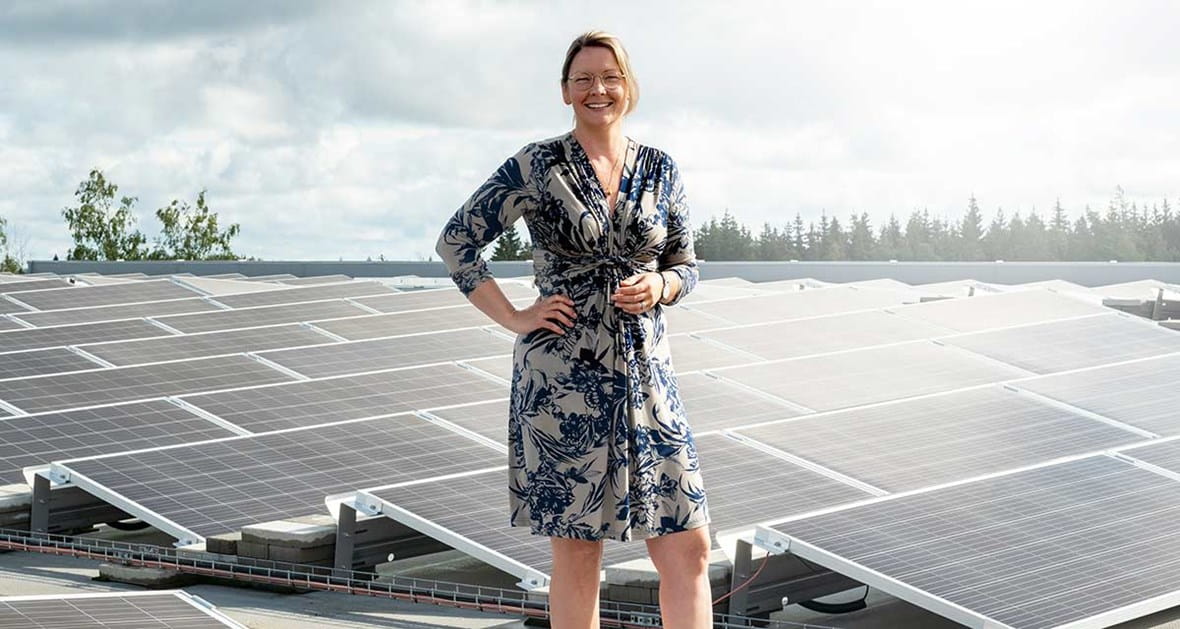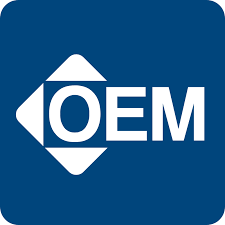CSR activities
Sustainability goals linked to Agenda 2030
For 2021, oem introduced a sustainability development programme to clearly define its sustainability activities, set out the goals it aims to achieve, and strengthen the focus on sustainability within the Group. The first step was to conduct a stakeholder and materiality analysis to enable new sustainability targets for the Group to be put in place. The targets are linked to Agenda 2030 and some of its 17 goals.
Stakeholders Analysis Results

Customers
Suppliers
Employees
Owners
Priority goals
OEM has prioritised 4 of the Global Goals based on the focal points and risk areas identified as having most significance to both oem and the Group's stakeholders.Materiality Analysis Results
The priority goals also cover the three aspects of sustainability.
Environmental responsibility
- The environmental impact from the Group's product and passenger transport, heating of premises, and products and packaging materials.Economic and ethical responsibility
- Financial stability and strength is essential for investment in sustainable business development. Ensure responsible business practices that represent human rights and oppose corruption.Social responsibility
- As a responsible employer, be able to offer employees skills development, a positive working environment, good health and safety, and oppose and prevent all forms of discrimination and harassment in the workplace.
Focus on sustainability at every stage
OEM's Board of Directors has, through the Group management, the ultimate responsibility for the Group's sustainability-related activities. The operational responsibility lies in a decentralised corporate culture in the companies. The companies have set their own targets and activity plans based on the overall sustainability goals of the Group. The sustainability board, with representatives from the larger companies, coordinate and ensure a high level of quality and focus on the sustainability work across the whole Group. Employees play a key role in identifying any non-conformances and are able to report suspected wrongdoing via a whistleblowing system. This is fully in line with OEM's commitment to a culture of openness and high ethical standards. This working model allows OEM to assure focus, quality and responsibility in sustainability practices at every stage. If necessary, the Parent Company further supports these activities with tools and processes.Sustainability through outstanding product and applications expertise
OEM strives to find good environmental solutions and supports development initiatives in these areas. Extensive knowledge of the products and applications also enables it to help customers make environmentally-sound and good-quality choices of components and solutions. In combination with supplier assessments, which provide information on the suppliers' sustainable development practices, this is both an integral part of its sustainability activities and a competitive advantage.
Warehouse management is another important part of OEM's sustainability programme. The operations are continuously working to optimise inventory levels of different products so that the correct quantities are purchased while improving availability for the customers.
Occupational health and safety as part of the sustainability programme
Health and safety is an area that has been prioritised by OEM in 2021. One example is the investment made for the installment of more mesh decking at the Höganloft logistics centre. Mesh decking is a racking system that prevents pallets from falling when forklifts are driven. This makes the work of loading pallets at high heights easier and creates a safer environment for staff and materials. It also means that single-use pallets can be used, which improves efficiency as the material does not need to be repackaged on arrival and continued use of the existing pallet is good for the environment. All pallet areas at Höganloft now have mesh decking.
Another example of implemented activities is the continuation of the energy-saving programme that has been under way at the Group for several years. The logistics centre has now upgraded more of its lighting system with new luminaires from Hide-a-lite, its sister company, and optimised the number of light sources to provide an appropriate light level. This has reduced annual electricity consumption by 70,000 kWh.
GHG Protocol reporting
OEM reports emissions of greenhouse gases as defined by the Greenhouse Gas Protocol(ghgProtocol), which is one of the most widely used emissions reporting standards in the world. The ghgProtocol requires emissions to be broken down into 3 categories, or scopes, where OEM focuses on reporting in accordance with scopes 1 and 2, and keeps to goods transport and business travel in scope 3.
Scope 1 Direct greenhouse gas emissions over which the business has control.
Scope 2 Indirect greenhouse gas emissions from electricity, district heating, district cooling and steam.
Scope 3 Other indirect greenhouse gas emissions arising in the value chain.
Goods transport generates a significant share of emissions, followed by business travel and heating of premises. OEM monitors the environmental impacts of freight transport operators to enable the best transport options to be selected, and reuses packaging materials as far as possible. The pandemic had a huge impact on the company's travel activities in 2021, which can be seen in the relatively low emissions from business travel. The results of the report also form a basis for further activities linked to the companies' sustainability goals.
| SCOPE 1 | 2021 | 2020 |
| Business travel by car | 948 tonnes of CO2 | 1 001 tonnes CO2 |
| Energy own premises | 28 tonnes CO2 | 26 tonnes CO2 |
| TOTAL SCOPE 1 | 976 tonnes CO2 | 1 027 tonnes CO2 |
| SCOPE 2 | 2021 | 2020 |
| Energy own premises | 131 tonnes CO2 | 159 tonnes CO2 |
| SUMMA SCOPE 2 | 131 tonnes CO2 | 159 tonnes CO2 |
| SCOPE 3 | 2021 | 2020 |
| Energy leased premises | 189 tonnes CO2 | 160 tonnes CO2 |
| Goods transport | 1 924 tonnes CO2 | 2 606 tonnes CO2 |
| Business travel | 42 tonnes CO2 | 37 tonnes CO2 |
| SUMMA SCOPE 3 | 2 155 tonnes CO2 | 2 803 tonnes CO2 |
Certified companies
In Sweden, OEM Automatic, OEM Electronics, Svenska Batteripoolen, Internordic Bearings, Telfa, Ernst Hj Rydahl Bromsbandfabrik, Svenska Helag, Agolux, ATC Tape Converting, OEM Motor and Elektro Elco have been awarded iso 14001 environmental management system certification and iso 9001 quality management system certification. In Poland, OEM Automatic has been awarded iso 9001 quality management system certification.

